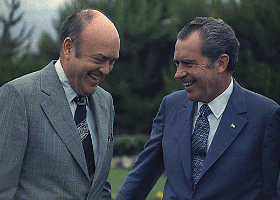On Tom's ranking of the SecDefs: A few words in defense of Laird and Johnson

By Lawrence Korb
Best Defense guest columnist
I think you unfairly overlooked Melvin Laird, who served as President
Nixon's first secretary of defense during the latter years of the Vietnam War
(1969-1973). As secretary, Laird had to not only manage the withdrawal of about
500,000 troops from Vietnam (two and a half times as many as from Iraq and
Afghanistan combined), but also get the Joint Chiefs of Staff to support the
plan. Laird also ended the draft and created the All-Volunteer Force, and
developed the Total Force, which made the reserve components a strategic
reserve for the first time by providing the Reserves with the equipment and
training to be called up and deployed, as they have been in Iraq and Afghanistan.
Laird also re-armed the military on a defense budget that, in
real terms, was $100 billion less than today's, even after the impact of the
sequester caps, and with his deputy, David Packard, executed the "hi-lo mix,"
in which the services bought the somewhat less capable but much cheaper F-16
and F/A-18 jets, but fewer of the more expensive F-15s and F-14s. In addition
to these managerial tasks, Laird also had to convince the Joint Chiefs of Staff
to support the first SALT treaty with the Soviet Union. Finally, Laird took on
Admiral Hyman Rickover, the father of the nuclear Navy, and forced him to place
24 tubes on each Trident submarine, rather than the 16 Rickover wanted. This
change meant that DOD would have robust nuclear capability without purchasing
as many costly subs in an era of declining defense budgets.
Furthermore, his appointments to the Joint Chiefs of Staff were
first rate. For example, he passed over 43 more senior admirals to make Admiral
Elmo "Bud" Zumwalt the chief of naval operations. During his tenure, the Navy
finally began to fully implement Truman's 1948 desegregation order and allow
African-Americans to have the same opportunities as other Navy personnel.
Louis Johnson, Truman's secretary of defense (1949-1950), was also
much more than just a political hack. True, he was the chief fundraiser for
Harry Truman during his 1948 re-election campaign, but he was also a graduate
of the University of Virginia law school (where Bobby Kennedy went) and was
elected to the Virginia House of Delegates.
Johnson also had sterling military credentials. During World War
I, he served as an Army Captain in France. Johnson co-founded the American
Legion following the war. From 1937 to 1940, during the early stages of World
War II, Johnson served as assistant secretary of war for President Roosevelt.
As secretary of defense after World War II, he supported
President Truman's desire to reduce defense spending and was not afraid of
making tough decisions despite the fierce resistance of the services, including
cancelling the aircraft carrier USS United
States, pushing for the further unification of the services, and increasing
the power of the secretary of defense. Johnson was a capable secretary of defense,
but was thrown under the bus by Truman when the Korean War and the Soviet
explosion of an atomic bomb exposed the problems with the president's attempts
to keep defense spending low.
Lawrence Korb, a senior
fellow at the Center for American Progress, served as assistant secretary of defense
for manpower, reserve affairs,
installations and logistics from 1981 to 1985.
Thomas E. Ricks's Blog
- Thomas E. Ricks's profile
- 436 followers



